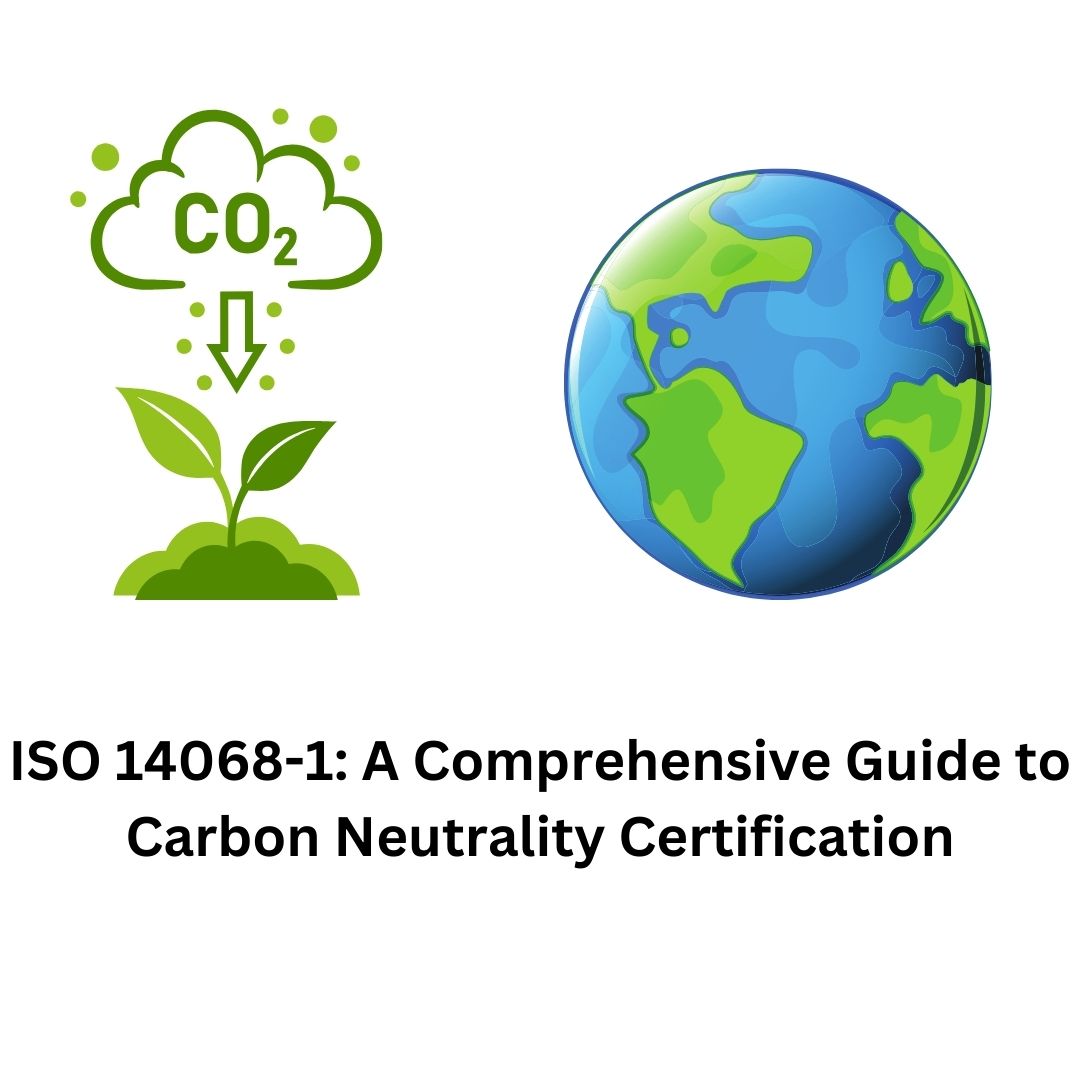Blog Details

ISO 14068-1: A Comprehensive Guide to Carbon Neutrality Certification
Introduction
In today’s world, climate change is one of the biggest challenges facing businesses, governments, and societies. Organizations are increasingly expected to adopt sustainable practices, reduce carbon emissions, and demonstrate accountability toward environmental impact. One of the most reliable ways to achieve this is through ISO 14068-1:2023 – Carbon Neutrality Certification.
This international standard provides a framework for organizations to measure, reduce, and offset greenhouse gas (GHG) emissions, ultimately achieving carbon neutrality. By following ISO 14068-1, companies can ensure transparency, credibility, and consistency in their sustainability claims, enhancing their reputation and meeting stakeholder expectations.
In this blog, we will explore the key aspects of ISO 14068-1, its importance, benefits, implementation process, and why choosing the right certification partner, like Ascent Inspecta, is crucial.
What is ISO 14068-1?
ISO 14068-1 is part of the ISO 14000 family of standards that focus on environmental management. Specifically, it addresses carbon neutrality—a state where the net greenhouse gas emissions of an organization, activity, product, or service are reduced to zero through effective emission reductions and verified offsets.
The standard provides principles, requirements, and guidelines for organizations seeking to demonstrate carbon neutrality credibly. It covers:
- → Identifying and calculating GHG emissions
- → Setting emission reduction targets
- → Implementing reduction measures
- → Offsetting residual emissions through verified carbon credits
- → Transparent communication of carbon neutrality claims
Why is ISO 14068-1 Important?
- → Climate Responsibility: Demonstrates a company’s proactive role in tackling climate change.
- → Market Competitiveness: Enhances brand reputation and attracts eco-conscious consumers and investors.
- → Regulatory Alignment: Helps businesses comply with international climate targets and national emission reduction policies.
- → Risk Management: Minimizes environmental, financial, and reputational risks.
- → Transparency: Provides a credible, standardized approach to sustainability reporting.
Key Features of ISO 14068-1
- → Comprehensive GHG Accounting: Identification and measurement of all relevant direct and indirect emissions across the value chain.
- → Reduction First Principle: Encourages organizations to focus on reducing emissions before relying on offsets.
- → Credible Offsetting: Only high-quality, verified carbon credits are acceptable for neutralizing unavoidable emissions.
- → Transparent Communication: Prevents greenwashing by ensuring accurate, evidence-based carbon neutrality claims.
- → Continuous Improvement: Promotes ongoing monitoring, reporting, and refinement of carbon management strategies.
Benefits of ISO 14068-1 Certification
- → ✅ Enhanced Reputation and Trust: Certified carbon neutrality builds stakeholder confidence by demonstrating that sustainability claims are backed by an internationally recognized standard.
- → ✅ Market Advantage: Consumers, investors, and business partners prefer organizations committed to environmental responsibility, giving certified companies a strong competitive edge.
- → ✅ Regulatory Preparedness: With governments introducing stricter climate policies, ISO 14068-1 helps businesses stay ahead of compliance requirements.
- → ✅ Operational Efficiency: The process of measuring and reducing emissions often leads to cost savings through energy efficiency and resource optimization.
- → ✅ Contribution to Global Goals: Certification supports alignment with international frameworks such as the Paris Agreement and the UN Sustainable Development Goals (SDGs).
Steps to Achieve ISO 14068-1 Certification
- → Understanding the Standard: Familiarize your team with the principles and requirements of ISO 14068-1.
- → Measuring Emissions: Conduct a comprehensive greenhouse gas inventory covering Scope 1, 2, and relevant Scope 3 emissions.
- → Setting Reduction Targets: Define realistic and science-based targets for reducing emissions across operations.
- → Implementing Reduction Strategies: Adopt energy efficiency measures, renewable energy, sustainable transport, and waste reduction practices.
- → Offsetting Residual Emissions: Purchase high-quality carbon credits from credible offset projects to neutralize unavoidable emissions.
- → Verification and Certification: Engage a recognized certification body like Ascent Inspecta to verify your claims and issue certification.
- → Transparent Communication: Publish clear and verifiable sustainability reports showcasing your carbon neutrality achievements.
Industries that Benefit from ISO 14068-1
- → Manufacturing: To minimize production-related emissions.
- → Energy: Transitioning toward cleaner, renewable sources.
- → Construction and Real Estate: Reducing carbon footprint in building projects.
- → Transport and Logistics: Cutting emissions across supply chains.
- → Retail and Consumer Goods: Meeting eco-conscious consumer expectations.
- → Finance and Investment: Demonstrating responsible investment practices.
Challenges in Achieving Carbon Neutrality
- → Difficulty in measuring Scope 3 emissions across supply chains.
- → High costs of implementing reduction technologies.
- → Ensuring credibility of carbon offsets.
- → Maintaining continuous improvement over time.
Partnering with an experienced certification body can help organizations overcome these challenges effectively.
Why Choose Ascent Inspecta for ISO 14068-1 Certification?
Achieving ISO 14068-1 certification requires expertise, precision, and credibility. Ascent Inspecta is a trusted partner that simplifies this journey with its deep industry knowledge and global recognition. We offer end-to-end support, from emissions assessment to certification, ensuring transparency and compliance with international standards.
- → Tailored guidance from certified sustainability experts.
- → Assistance with emissions measurement, target-setting, and strategy implementation.
- → Trusted audits and transparent verification processes.
- → Proven success with multinational clients across sectors.
- → Commitment to quality, integrity, and client satisfaction.
Conclusion
ISO 14068-1 provides a globally recognized framework for organizations striving to achieve and demonstrate carbon neutrality. By adopting this standard, businesses not only fulfill their environmental responsibilities but also gain a competitive edge, build trust, and contribute meaningfully to global climate action. Partnering with a credible certification body like Ascent Inspecta ensures that your journey toward carbon neutrality is transparent, reliable, and impactful.
Leave a Comment
We would love to hear your thoughts! Please leave your comment below:
